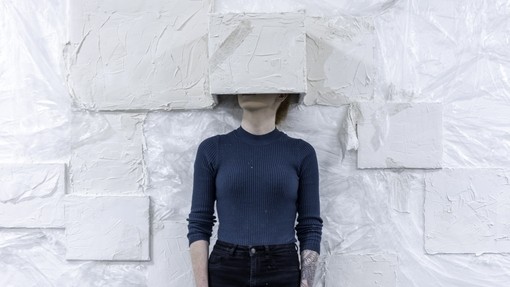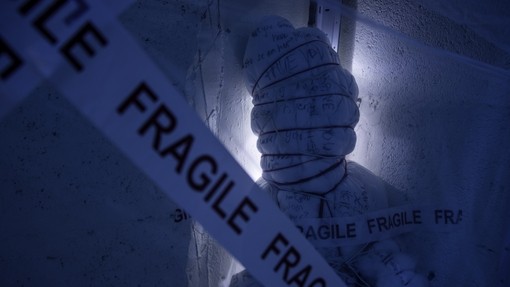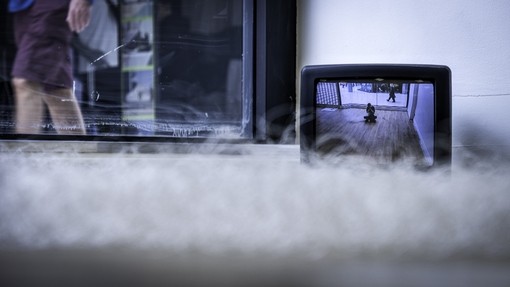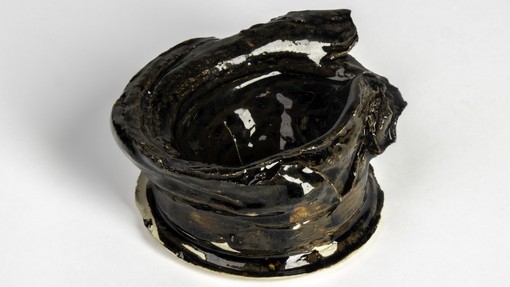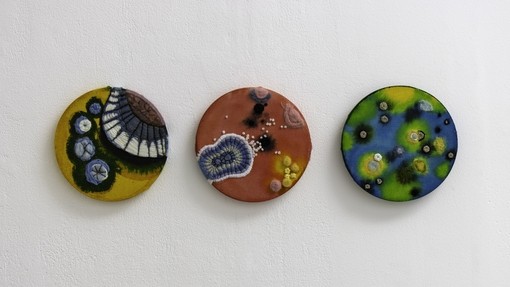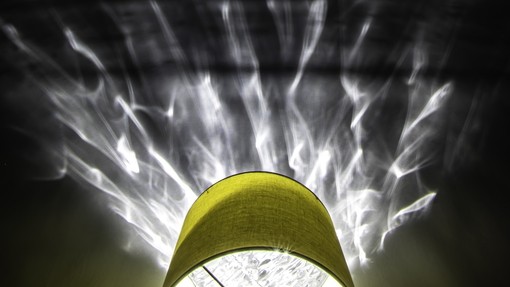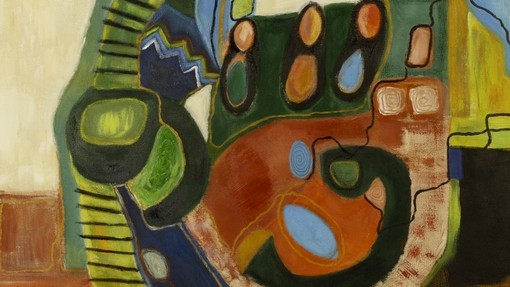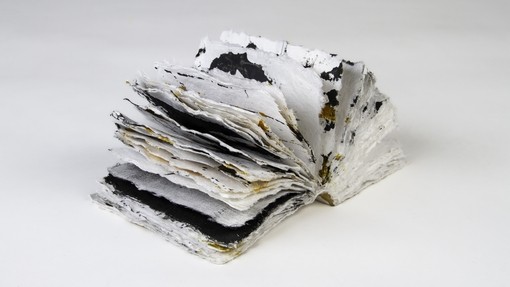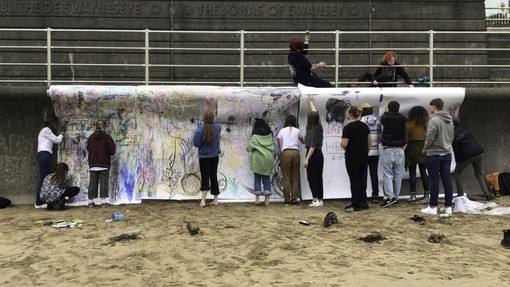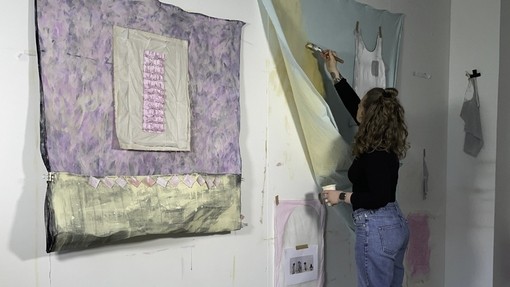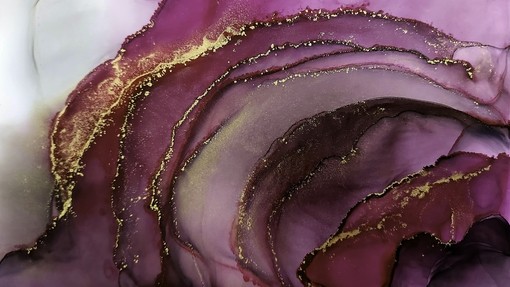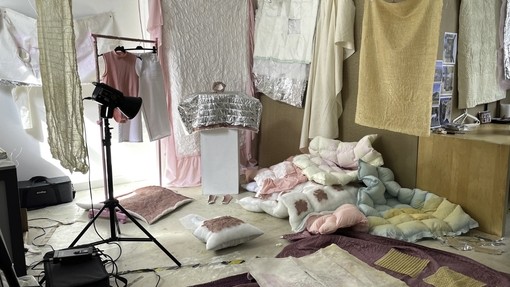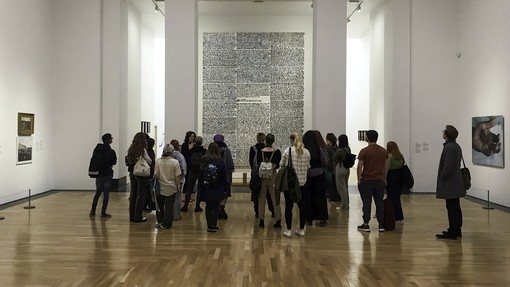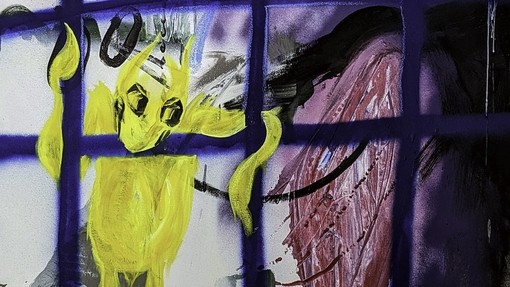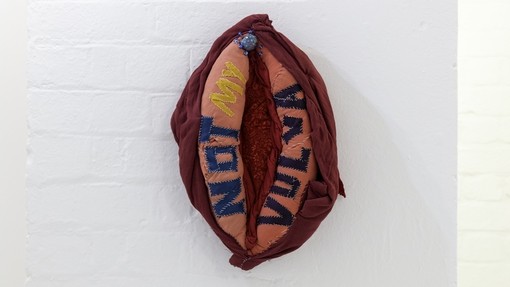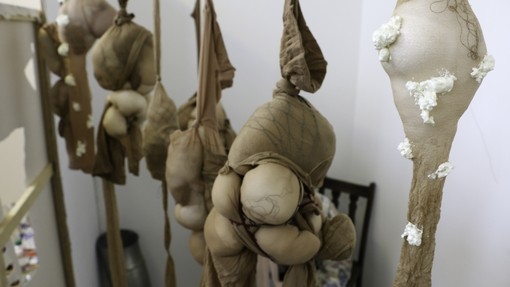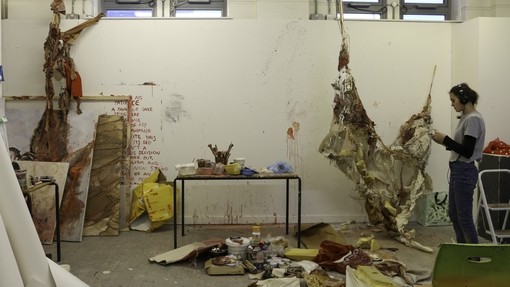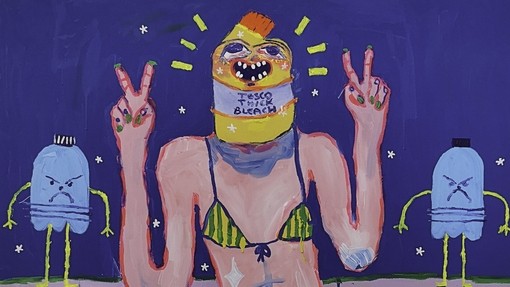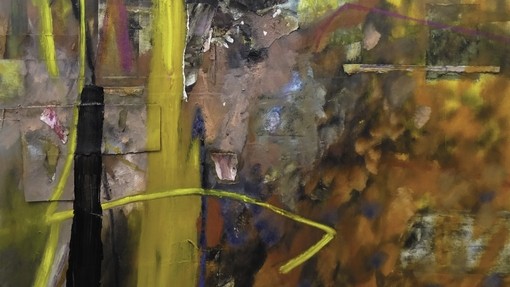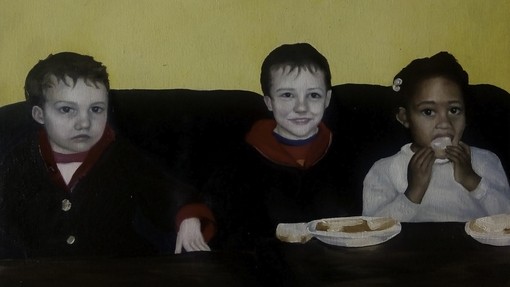Fine Art: Studio Site and Context (Full-time) (BA Hons)
UWTSD Fine Art: Studio, Site and Context encompasses a broad approach to fine art teaching where individual artistic practice draws upon, and uses, a wide range of materials, media, concepts, and philosophies.
Studio practice is at its core and involves the use of specialised workshops and personal spaces where concepts are developed through painting, drawing, sculptural practice, video, sound, installation, and performance.
The course encourages all students to consider their position within society, providing an opportunity to work alongside internationally acclaimed artists and lecturers to explore the expanding and forever-evolving field of contemporary fine art practice.
Course details
- On-campus
- Full-time
- English
- Bilingual
Tuition Fees 2023/24 and 24/25
Home (Full-time): £9,000 per year
Overseas (Full-time): £13,500 per year
Why choose this course?
What you will learn
Fine Art: Studio, Site and Context encompasses and celebrates a broad and open approach.
You are able to draw upon and utilise an expansive range of materials, media, concepts and philosophies to develop your work and convey your ideas.
Studio practice is at the core of our teaching and encompasses the use of a wide range of workshops, together with personal studio spaces. The studios are our powerhouse, a place where your ideas are explored and developed through material practices — painting, drawing, sculptural practice, video, sound, installation and performance.
Site is key to our teaching in Swansea, both in terms of concept and place. The relationship between our Fine Art department and the city has developed over many years, resulting in our graduates developing artists’ studios and gallery complexes. Our staff are professionally involved with major art institutions that have formed links with the course, enabling you to engage in cultural activities beyond the university.
The notion of Site in relation to Context is an important consideration, and you are encouraged to explore this relationship. Explorations of Context form a central pillar of your course. The importance of Context is taught through theory lectures, practice-based lectures, seminars and workshops. Our teaching investigates Context, from the contemporary, political, conceptual, philosophical and practical, including explorations of site responsiveness as well as developing an awareness about the appropriateness of materials.
Experimentation, investigation and questioning are vital aspects of both practice and theory throughout the course. Grasping these key themes enables you to respond to the expanding field of contemporary practice and the broad spectrum of interdisciplinary opportunities.
This articulation between concept and media is a fundamental characteristic of contemporary fine art practice. To this end, our Fine Art: Studio, Site and Context course encourages you to think creatively and enables you to be free to explore media and push your ideas to the limits and beyond. The emphasis is placed on the relevance and significance of materials/medium in relation to your ideas and contexts.
In our course, we believe that there is no hierarchy of medium.
We do, however, place significant emphasis on the concepts of ‘time and place’, as artists often work within the context of their social, historical, political and geographical positions.
Our programme encourages you to consider your position within society, both historically and contemporaneously.
This historical and contemporary contextualisation ensures that you are able to locate your own work, and it also provides you with a multitude of references and inspiration for comparison and example.
Our Fine Art: Studio, Site and Context course thus encourages you to be aware of theoretical debates, contemporary practice and the historical precedents relevant to your creative development; consequently, the studio becomes an energised and animated forum for both discussion and practice.
Our course also places great emphasis on the relationship between the professional processes of making art and its long-term sustainability. Our teaching team has a considerable international reputation within their individual fields and these combined experiences provide a range of expertise from painting, drawing, video, installation, site-specificity, curatorship and publishing. These ventures all contribute to a very hands-on experience-based knowledge of both curating and exhibiting.
This programme provides a direct connection between the international platforms of contemporary practice and your dedicated studio space situated in our Dynevor building, at the heart of Swansea city centre.
(10 credits)
(10 credits)
(20 credits)
(10 credits)
(10 credits)
(20 credits)
(20 credits)
(20 credits)
(20 credits)
(20 credits)
(10 credits)
(10 credits)
(10 credits)
(10 credits)
(20 Credits)
(20 credits)
(40 credits)
(60 credits)
(20 credits)
Course Page Disclaimer
-
We listen to student feedback and insights from industry and from professionals to ensure that course content is high-quality and up-to-date, and that it offers the best possible preparation for your future career or study goals.
For this reason, there might be modifications to the content of your course over time, to keep up to date with changes in the subject area or in the sector. If a module is no longer running, we’ll make sure to keep you informed, and work with you to choose a different suitable module.
testimonial
Staff
Our People
You will be taught and supported by a wide range of professional staff and teams here to help you get the university experience you are looking for. Our teaching staff were ranked 2nd in Wales for assessments and feedback (NSS 2023) meaning the comments you get back from your work will help you learn. Our commitment to your learning has seen our students place us as Top 10 in the UK for Lecturers and Teaching Quality. Find out more about our academic staff who teach across our courses.
Accommodation
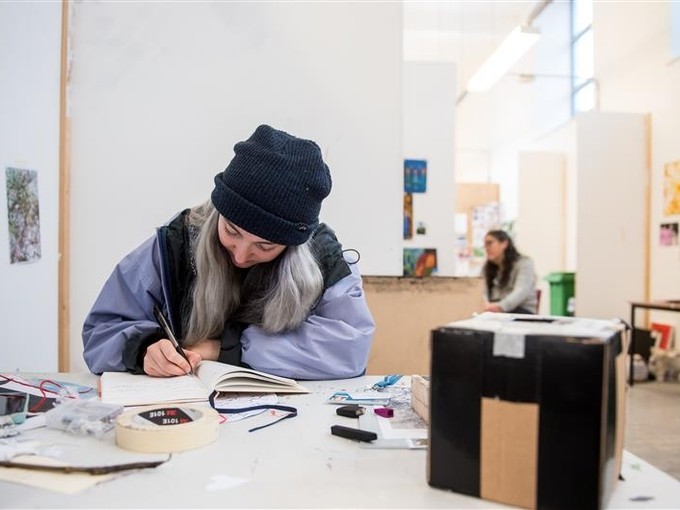
Fine Art Facilities
Our excellent facilities also include metal, wood, resin and ceramic workshops, as well as laser and water-jet cutters, students also have access to digital studios/darkrooms, life drawing classes and printmaking facilities.
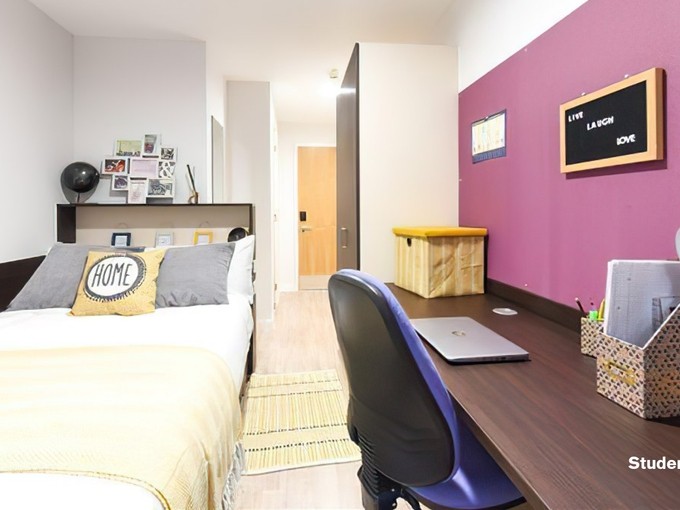
Swansea Accommodation
Swansea has a huge student population, and the variety of accommodation available will leave you feeling spoilt for choice. Various purpose-built student accommodation providers provide accommodation in Swansea, and the accommodation team can guide you through your options. It will offer ongoing support throughout your time as a UWTSD student.
Fine Art Gallery
Further information
-
We are interested in creative people who demonstrate a strong commitment to art and/or design and, therefore, we welcome applications from individuals from a wide range of backgrounds.
We arrange interviews for all applicants to assess suitability for the chosen course. Your skills, achievements and life experience will be considered, as well as your portfolio of work.
Our standard offer for a degree course is 120 UCAS tariff points. We expect applicants to have a grade C or above in English Language (or Welsh) at GCSE level, together with passes in another four subjects. We also accept a range of Level 3 qualifications, including:
- Foundation Diploma in Art and Design, plus one GCE A-Level in a relevant academic subject
- Three GCE A-Levels or equivalent
- UAL L3 Extended Diploma in Art and Design.
- UAL L3 Applied General Diploma and Extended Diploma in Art and Design.
- UAL L3 Diploma and Extended Diploma in Creative Practice: Art, Design and Communication.
- BTEC Extended Diploma in a relevant subject
- International Baccalaureate score of 32
- Other relevant qualifications can be considered on an individual basis.
Qualifications are important; however, our offers are not solely based on academic results. If you do not have the required UCAS points, then please contact the course’s admissions tutor, or email artanddesign@uwtsd.ac.uk, as we can consider offers to applicants based on individual merit, exceptional work, and/or practical experience.
See our Interview Guide for more information.
-
Assessment is carried out through coursework, both written and practical. There are no exams on this course.
Students are formatively assessed throughout a module; summative assessment takes place at the end of a module. A variety of teaching and learning methods are used throughout the course, including:
Tutorials
These tutorials are given across all levels. A more intense period of one-to-one tutorials occurs for the third year students who are by now working more independently. Students can request a tutorial when the need arises. However, as a team, we ensure that students are given valuable and regular support from all members of staff.We strongly believe in students receiving individual tutorials in order to support their creative journeys.
The work, including practical and conceptual development, is discussed, along with the future intentions of the student. It is an opportunity for any issues/concerns by either party, to be raised. A written account of the tutorial is duplicated, one copy kept by the student the other stored in record files.Group critiques
These are held across all levels. They provide an excellent opportunity for students to share and exchange ideas with their peers in a structured manner in addition to valuable input from staff.Informal & Formal presentations
All students are given opportunities to talk to their fellow students about their work, allowing them to understand the importance of presentation within a fine art practice. Formal Presentation in the third year is part of their Major project leading up to the final assessment at the Degree Show.Exhibiting work
The nature of this varies within the context of the years. All assessments for first and second years are presented at the individual student’s studio space, followed by an end-of-year joint show within the prepared spaces, as vacated by the degree show. The preparation of these spaces, from takedown of studio spaces to conversion to exhibition, is taught, and understood, very much within the context of professional practice, for the third year. -
Our students have access to a diverse range of equipment and resources, which in most cases are sufficient to complete their programme of study.
We provide the basic materials necessary for students to develop their practical work within our extensive workshop and studio facilities.
However, art and design students will likely incur additional costs to extend their investigation of their personal practice, such as purchasing their own specialised materials and equipment, joining optional study trips, and printing.
Students are expected to bring their own personal art and design equipment when they commence the course. We can advise on the correct equipment needed for your studies and signpost appropriate suppliers if you wish to purchase essential items before or during your studies.
A basic ‘art and design kit’ will cost approximately £100, but you may well already have much of the equipment required, so check with us first. While we have extensive dedicated digital design studios (PC and Mac) for you to undertake your coursework, you may also wish to bring your own digital devices. Check with us first before making a purchase.
-
You may be eligible for funding to help support your study. To find out about scholarships, bursaries and other available funding opportunities, please visit our Scholarships and Bursaries section.
-
Students can also take up the opportunity to study a semester in Europe, USA or Canada.
-
There are numerous opportunities ahead of our Fine Art students, where their multi-skilled approach allows them to develop into a number of professional artistic avenues, including:
- Professional practising artist
- Curator/museum and gallery management
- Art therapy
- Project leader in community art
- Teaching/lecturing

